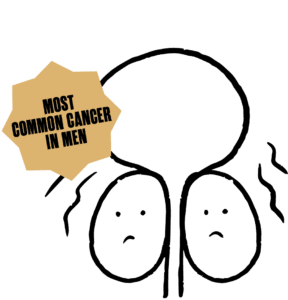
What is Prostate Cancer?
Prostate cancer is a type of cancer that starts in your prostate gland. The majority of prostate cancers are adenocarcinomas, which develop from the cells that make prostate fluid that is added to semen. There are other rare types of cancer that can start in the prostate, including small cell carcinomas, neuroendocrine tumors, transitional cell carcinomas, and sarcomas. Most prostate cancers grow slowly.
Who Does Prostate Cancer Affect?
Prostate cancer occurs in people who were assigned male at birth. It mostly occurs in people older than 50 years old and is more common in Black men than men of other races.
In 2024,
299,010 new diagnoses
35,250 people will die
During their lifetime,
~1 in 8 men will be diagnosed
Prostate Cancer Facts
Prostate cancer has a
~100% 5-year survival rate
New diagnoses of prostate cancer are more than 70% higher in non-Hispanic Black men than in non-Hispanic White men. Black men’s prostate cancer mortality is more than double that of White men.
*Note: All statistics are based on the U.S. population.
Why? Black men (African American or Caribbean of African ancestry) are genetically at a higher risk of prostate cancer.
Why? Increased prostate cancer incidence and mortality among Black men may be due to lower access to healthy food and higher rates of obesity, as well as lower access to health insurance, cancer screenings, and care. This means Black men’s prostate cancer is often caught later when it is harder to treat.
Prostate Cancer Risk Factors
The risk factors of prostate cancer are a combination of your genetics and lifestyle choices. Whether you have one or all of these risk factors, there is no guarantee you will develop prostate cancer in your lifetime. Risk factors are important to understand so you can adjust your lifestyle-based risks and talk to your doctor about your overall risk.
- Being assigned male at birth
- Being older than 50 years old
- Having African American or Caribbean of African ancestry
- Having a father or brother with prostate cancer
- Testing positive for inherited genetic mutations like BRCA1 or BRCA2
- Having Lynch syndrome (aka hereditary non-polyposis colorectal cancer or HNPCC)
- Smoking cigarettes
- Being obese or overweight
- Eating lots of dairy products
- Having high-grade prostatic intraepithelial neoplasia (PIN)
- Having proliferative inflammatory atrophy (PIA)
Prostate Cancer Warning Signs
Early prostate cancer usually causes no signs or symptoms, but more advanced prostate cancer can sometimes cause symptoms, including:
- Trouble urinating, including a slow or weak stream or urinating more often
- Blood in your urine or semen
- Trouble getting an erection, including erectile dysfunction
- Bone pain, specifically in your hips, spine, or ribs
- Weakness or numbness in your legs or feet
- Loss of bladder or bowel control
Learn more about cancer Early Detection.
Notice a warning sign? Talk to your doctor, not WebMD!
Preventing Prostate Cancer
There is no surefire way to prevent prostate cancer. However, you can make active decisions regarding your health that can potentially reduce your risk of prostate cancer.
Learn more about cancer Prevention.
Finding Prostate Cancer Early
The benefits of screening for prostate cancer have not been fully researched. Due to this, prostate cancer screenings are optional and up to you to decide if you want to pursue a screening. Talk to your doctor about your risk factors and if you’re experiencing any warning signs to determine if prostate cancer screening is right for you. If do decide to get screened, your options include:
Prostate-Specific Antigen Blood Test
This screening option tests your blood to check for prostate-specific antigens (PSA). If your PSA level is high, you may need to do additional testing to determine if you have prostate cancer.
Digital Rectal Exam (DRE)
This screening requires a doctor to place a gloved, lubricated finger inside your rectum to feel your prostate gland for any bumps or hard areas that might be cancer.
Prostate Biopsy
A prostate biopsy is often completed after an abnormal PSA blood test result. During a biopsy, small samples of your prostate will be removed to be examined under a microscope.
Who Should Get Screened?
- If you are at average risk of prostate cancer, start talking to your doctor at age 50 about if screening is right for you.
- If you are a Black man or have a close relative with prostate cancer, start talking to your doctor at age 45 about if screening is right for you.
- If you have several close relatives with prostate cancer or have certain genetic mutations, start talking to your doctor at age 40 about if screening is right for you.
Prostate Cancer Treatment Options
Prostate cancer treatment is very personalized and depends on several factors. If you’ve been diagnosed with prostate cancer, you will typically undergo one or more of these treatments:
Observation or Active Surveillance
Because prostate cancer often grows very slowly, these methods allow your oncologist to track any development in your cancer with a more “wait and see” approach, while avoiding more aggressive forms of treatment. You will likely complete regular testing to track any changes.
Surgery
Surgery is a common treatment option if your cancer hasn’t spread beyond the prostate gland. In most cases, the entire prostate gland and some of the tissue around it, including the seminal vesicles, will be removed during surgery.
Radiation Therapy
Radiation is often used as a first treatment approach for prostate cancer and uses high-energy rays or particles to kill cancer cells. Common types of radiation therapy used to treat prostate cancer include External Beam Radiation, where radiation beams are focused on the prostate gland from a machine outside of the body, and Brachytherapy, where small radioactive pellets (aka seeds) are placed directly into your prostate.
Hormone Therapy
Hormone therapy works to reduce your hormone levels or stop them from fueling prostate cancer cells. It is often used in combination with other types of treatment.
Chemotherapy
Chemo uses anti-cancer drugs injected into your body or taken orally to fight prostate cancer. Chemo is typically used as a treatment of more advanced prostate cancer.
To learn more about what to expect at your first treatment appointment, visit our Life With Cancer page.
After Prostate Cancer Treatment
After prostate cancer treatment, there is always a chance of recurrence, where the prostate cancer can come back, or a second cancer, where you are diagnosed later in life with an additional type of cancer. Making healthy lifestyle choices can help prevent a second cancer from developing.
Common Experiences of People with Prostate Cancer
While each person’s experience with prostate cancer is personal and unique, there are some common experiences that people with prostate cancer may be going through.
New Feelings About Sexuality
Due to the prostate’s function in the body, prostate cancer treatment can lead to erectile dysfunction or other changes to your sexual ability. This can impact your sexual satisfaction and reduce your sexual confidence, which may make you feel less manly. These changes may feel particularly notable to men who have sex with men. Try finding other ways of feeling confident and being sexually intimate that are not erection-dependent.
Worrying About Your Urinary and/or Bowel Control
Some people with prostate cancer experience urinary and/or bowel control changes that can feel humiliating, result in poor self-image, cause them to withdraw socially, and act as a deterrant to engaging in sex.
Changing Sense of Self and Body Image
Some prostate cancer treatments lead to a loss of testosterone, which can feel emasculating for some people. Decreased testosterone levels in the body can lead to physical changes such as fatigue, weight gain, muscle loss, breast enlargement, genital shrinkage, and body hair loss, and emotional changes such as depression, anxiety, and mood swings.
Source: American Cancer Society; Centers for Disease Control and Prevention









